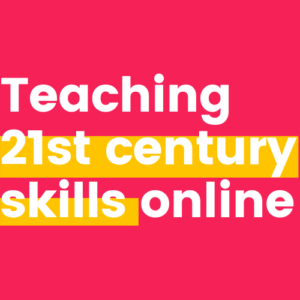
We are living in a world that is currently facing unprecedented challenges due to a pandemic.
However, such is the human spirit that even in adverse circumstances there is a lot of room for ingenuity and creativity. A country-wide lockdown has made it imperative that educational institutions join the digital platform to make sure that at least learning remains immune to this virus.
Most of the schools and colleges around the world have shifted to online classes to help students continue their education from the comfort of their homes.
Tips To Follow To Plan An Online Lesson
We reached out to teachers via our social media channels and Cambridge Teacher Community all over India to share tips on mastering remote teaching. Thank you to all the teachers for sharing their tips and best practices. We will be sharing these tips in series of articles.
These are some of the great tips to keep in mind when you are planning your online classes.
Precise, concise and audible instructions
Ensure a good internet connection at your home. Instructions to the children must be precise and concise and your voice should be audible. Try to engage your class by making eye contact with them. Instead of delivering lectures try to use resources from home that connects to your topic and plan some energizers like yoga, rhymes and other exercises for children. We can also share our screen on Zoom so that we can use extensions to stay focused. – Bhavya Rustagi, Nehru World School, Ghaziabad
In the first 5 mins of the session give apt and clear instructions to the kids. This will help conduct the session with an uninterrupted flow. Secondly plan short content. – Sadaf Rizvi, Podar International School (CIE), Kalyan, Maharashtra
Use more visuals!
You need to be self-motivated to learn new technology. Enjoy the process more than anything. Develop modules that can be conducive to online teaching. Use more visuals rather than too much lecturing. It can sometimes get difficult due to interruptions in the network. It can be very useful if couples with resources can be used and referred to offline. – Sudipta Dutta, Ashoka Global Academy, Maharashtra
Videos for Home Assignments
We as teachers can make some videos on activities that children can do at home and assign work to the children.- Alsaba Khan, Rims International school and junior college, Maharashtra
Teachers become Learners
To understand remote learning and to implement it well, a teacher must first willingly broaden her view on the same. I understand that learning cannot be entirely digital, because it needs that live experience in the class which is of utmost importance, but the more you explore the more you get used to these methods and softwares for remote learning. It is the best way to integrate ICT skills not only in the students, but also in the teachers! – Sanskirit Sharma, Ashoka Global Academy, Maharashtra
Set up for your Online Classes
Anupam Dixit, Nehru World School, Ghaziabad listed the must – dos while planning and setting up your online class.
- Lesson planning is essential.
- Keep the class interactive. Ask questions so that students can feel involved.
- Keep the pace slow and speak words clearly.
- Use a variety of materials like pictures and animations.
- Teacher ‘s appearance is important. Wear formals.
- Use natural backgrounds. Home chores should not be visible.
- Choose a wall as the background.
Keep it short
Noorjahan Sajid Qureshi from Al barkaat Malik Muhammad Islam English School, Maharashtra suggested how to create short lessons and assessments to ensure clear understanding.
Teachers can first divide a lesson/chapter into small units, and then search for relevant videos or animations or make Powerpoint presentations for each topic.
Teachers can prepare questions for each topic. After preparing for each topic and making relevant questions, start sending it to the class group on WhatsApp, one unit at a time.
A proper time should be set for sending the content and questions. For doubt clearing sessions on WhatsApp, students should be allowed to call and discuss their doubts with the respective subject teacher.
Mini Lessons
Pushpinder Kaur from Bal Bharati Public School, Ganga Ram Marg, New Delhi suggested the same to ensure attention of students.
Create mini lessons or modules using simple softwares like Powerpoint and convert them to videos – not too long and with limited amount of text on each screen. Modules should always have the teacher’s voice (work on voice modulation & with practice, you will get better)
Active Learning at Home with movies
Naimisha Sanghavi shared tips to make learning fun
- Teach don’t preach. Watch a children’s films together and then have a discussion about it through the day. The trick is in selecting the right movie. With a little research you will find lots of Indian and international movies that share a message. This also helps them see and understand other cultures.
- Involve children in house chores; define small tasks depending on their age and assign it to them. Praise and make them answerable for it as children are your assets.
Activity Based Learning Using Resources at Home
Shahnaaz Abbas from Don Bosco High School Matunga, Mumbai is making her online classes fun using things easily available in every house.
Learn measurement of weight and capacity using labels of bottles, packets, tetra packs stocked at home. Read labels, compare and organize according to weight/height.
Using different objects at home like ice cream sticks, toothpicks, buttons or coins, write the names of your family members. Then arrange these alphabetically. If possible try to find smaller hidden words in these names eg ran , ‘an’ from Karan. Make as many words as possible from your own name.
RIght time for Value Education
To engage the students by imbibing value-based stories, and developing their creativity in drawing, art and craft like cooking without fire. It’s very important for teachers to touch on social responsibility by encouraging students to be responsible towards others and their surrounding. – Vandana K.Prasad, OES International School, Maharashtra
Cambridge Supporting Every Teacher
At Cambridge University Press, we share teachers’ ambitions to prepare students for success in life, both academically and personally. This rich insight, and our common goal helps us in the development of every new educational initiative we take. Through the Cambridge Teacher Community – Teachers of Tomorrow platform, we bring together the best thoughts and ideas to assist teachers to ensure Better Learning.
At TOT, it is our endeavour to integrate the teaching community. We intend to support the community by sharing all of your wonderful ideas, thoughts, views and suggestions. So, keep sharing your expert tips and we hope that TOT is that place where you keep coming back for more.
How are you dealing with the current shift to digital classroom? We have created a dedicated page with updates to help you in planning your digital lessons. Check it out here
How teachers can develop a Growth Mindset!
Tips to Help You Master Remote Teaching
A checklist for choosing effective collaboration tools
Using a video conference platform for teaching online
English activities around the home






